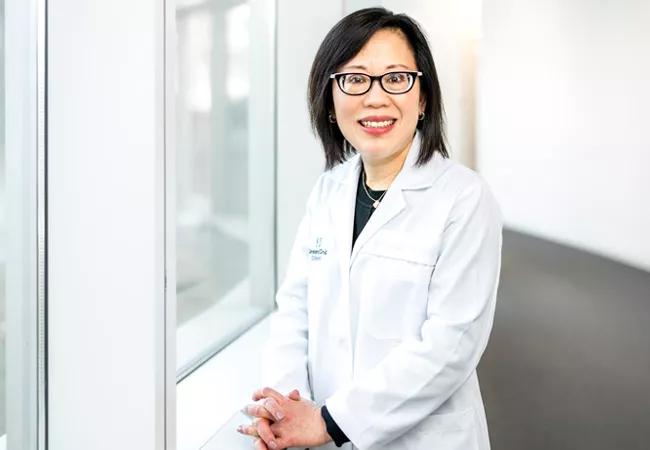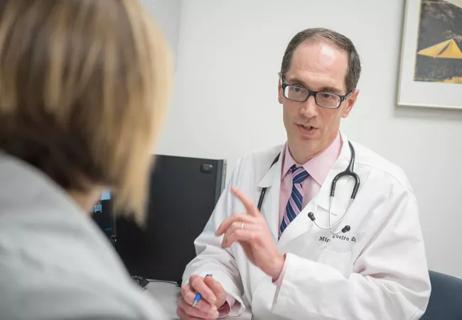Dr. Kim shares her vision for the department, clinical and research interests, and much more

Sandra Kim, MD, appointed to lead Cleveland Clinic Children’s Department of Gastroenterology, Hepatology and Nutrition, says a childhood diagnosis of chronic gastrointestinal and liver diseases like inflammatory bowel diseases (IBD) represents one of the great challenges and opportunities of modern medicine.
Advertisement
Cleveland Clinic is a non-profit academic medical center. Advertising on our site helps support our mission. We do not endorse non-Cleveland Clinic products or services. Policy
“We are in a time of incredible advances within the specialty. We can tell a parent that their child has a chronic gastrointestinal disease and what the consequences of such may be, but, at the same time, there isn’t a cure,” Dr. Kim says. “However, while we look for the cures to these illnesses, we need to continue focusing on optimizing the health and quality of life for the children and young adults entrusted to our care.”
These diagnoses involve multidisciplinary care across a health system, which can be incredibly daunting and difficult for most patients and families. However, Dr. Kim is hopeful this will one day change. Her vision for the department is ambitious and straightforward:
A nationally recognized expert in pediatric and adolescent IBD, Dr. Kim brings more than two decades of experience as a clinician, scientist, educator, mentor and patient advocate.
Most recently, she served as Director of the IBD Center of the Division of Gastroenterology, Hepatology and Nutrition at the Children’s Hospital of Pittsburgh of the University of Pittsburgh Medical Center and as an Associate Professor of Pediatrics at the University of Pittsburgh School of Medicine. Before that, she served as faculty and Co-Director of the IBD Center at Nationwide Children’s in Columbus, Ohio.
Advertisement
She is on the board of directors for ImproveCareNow, a national pediatric IBD quality improvement network. She also is an active member of the Crohn’s and Colitis Foundation. She has served in numerous national leadership roles, including as past chair of Governmental Affairs and Pediatric Affairs committees, and on a regional level as the past board president for the Western Pennsylvania/West Virginia chapter and incoming member for the Northern Ohio chapter of the Foundation.
She has published extensively on pediatric IBD — as a National Institutes of Health (NIH) and Crohn’s and Colitis Foundation-funded basic scientist earlier in her career and, more recently, as a leader in IBD quality improvement initiatives and patient advocate.
In an interview with Consult QD, Dr. Kim discusses the evolution of her career, a personal experience with Cleveland Clinic, the importance of mentorship and sponsorship, patient advocacy and much more.
Dr. Kim: I am joining a pediatric GI and hepatology program already among the best nationally at what they do clinically. Cleveland Clinic shines in a way few other healthcare systems are able to as a quaternary hub of clinical, research and educational innovations. Through the leadership of Dr. Miguel Regueiro, Chair of the Digestive Disease and Surgery Institute (DDSI), Cleveland Clinic has developed this “medical home” concept for delivering comprehensive digestive disease care. Furthermore, the DDSI continues to develop and expand as an international leader in other clinical initiatives, while further expanding our knowledge of disease mechanisms through partnerships with the Lerner Research Institute.
Advertisement
As we continue the growth of pediatric services through the leadership of Dr. Karen Murray and Dr. Robert Wyllie ― not just in Northeast Ohio ― but on a national scale, we will utilize models like this to improve how clinical care is delivered to the pediatric patients and families in our system.
On a personal note, my partner Bill, who has given me permission to share this, and I were on the receiving end of care at Cleveland Clinic in March 2020, right before the pandemic as the world was starting to shut down. He could go anywhere, but we chose Cleveland Clinic. As a patient of the Neurological Institute, he had several pre-op appointments prior to surgery. We are both healthcare professionals and can comfortably navigate a healthcare system, but we were blown away by how well everything was organized and planned. Furthermore, as a loved one of someone going through this whole process, I was struck by the kindness of the individuals we met. I reflect on this experience because every child and their family in our care deserves this level of service and attention.
Dr. Kim: My vision is quite simple:
Advertisement
Dr. Kim: I was an NIH- and Crohn’s and Colitis Foundation-funded scientist in the early part of my career. I planned to join a private practice in Houston following fellowship from Texas Children’s Hospital. Instead, with encouragement from my mentor, famed physician-scientist R. Balfour Sartor, MD, whom I met at a conference in Philadelphia, I changed my career path and took a position as a research post-doc at the University of North Carolina. I studied the pathophysiology of intestinal inflammation to understand how genetics, the microbiome, and other environmental triggers impact disease progression.
Exploring these processes was fundamental in my early academic career. However, as my clinical practice expanded, my career path moved away from traditional “bench” research. I had the opportunity to become the medical director of the nationally recognized IBD Center at Nationwide Children’s Hospital. This is where my focus in quality improvement began. During this same time frame, I expanded my work in patient advocacy — cost and access to care — and on comprehensive patient-centered care models.
All facets of the research are essential. Understanding the basic pathophysiology of chronic diseases allows us to develop therapeutic interventions, non-invasive predictive biomarkers, and impacts future outcomes with the ongoing hope for cures. But at the same time, when you have children with chronic illnesses, you must take care of things in real time.
Dr. Kim: My early involvement in the Crohn’s and Colitis Foundation gave me an opportunity to lead patient advocacy at a national level as past chairs for Pediatric Affairs and Government Affairs. I also appreciated the opportunity to be a member of the Pediatric Research Collaborative, known as PRO-KIIDS, since its inception over a decade ago. It has been an honor to be recognized for this work with the Foundation’s Rosenthal Award in 2011 and 2018, and later again in 2020 with the Uniting to Care and Cure Award.
Advertisement
I am also involved with advocacy and education through ImproveCareNow (ICN), North American Society for Pediatric Gastroenterology, Hepatology and Nutrition (NASPGHAN) and the Crohn’s and Colitis Young Adult Network (CCYAN), where I serve as a member of the Medical Advisory Board (along with Dr. Regueiro and others).
I know I am not alone in this — many physicians understand the difficulty of getting patients the treatment they need because of insurance-related barriers. I am passionate about improving payer transparency, the cost of care, and access to treatment for my patients, who often require medical nutrition and biologic therapies for their chronic illnesses that aren’t always readily available to them because of these barriers. Patients should not suffer because of this. There are ongoing efforts by my colleagues on the advocacy committees of NASPGHAN, the Crohn’s and Colitis Foundation and ICN to address these issues through legislative efforts, health services research and quality improvement projects.
Dr. Kim: As gastroenterologists, we cannot ignore the role of nutrition in the development and progression of GI and liver diseases. We need to have a better understanding of the pathophysiology and impact of nutrition in these disorders. Other things we must address include: the significant differences in access to nutritious foods, which directly impacts malnutrition and obesity on a global level, and the secondary outcomes on underlying disease. We can do all of the best, practice-changing research, but if we aren’t getting the right interventions to our patients, we have to address these issues as physicians and researchers.
We are excellent at collaborating through multicenter networks within our subspecialty. This provides the foundation as we look at more targeted interventions. This is important when looking at all the pieces: disease pathophysiology, biomarkers and therapeutics. As we continue to personalize approaches by predicting which patients will benefit from which therapies, we can, hopefully, intervene more quickly and thoughtfully and alter the natural history of the disease and improve quality of life, while being better stewards of healthcare resources in this process.
Dr. Kim: I want to train and support people who will be better than me. I think we’ve failed if we don’t set up the next generation for success. They need to carry on what we do, which is more important than ever in healthcare.
Effective career coaching and mentoring can ultimately shape the trajectory of someone’s career. I always tell mentees that what they do clinically, academically and professionally may be distinct categories but also are complementary to each other. More importantly, while mentorship gives the next generation of leaders the foundation and experience for success, we also need to be good sponsors for our mentees. I like to think of sponsorship as a means of giving your colleagues a “seat at the table” and mentorship as the process that has allowed them to get there successfully.
On a personal note, I wouldn’t be where I am today without my professional mentors and sponsors. However, the ultimate mentor in my life was my grandmother. She was the chief of staff for a women’s college in South Korea and a role model to many young women during a time in Asia when women weren’t necessarily empowered to have a voice. She always reminded me to treat everybody with kindness and integrity.
Dr. Kim: My simple mission statement hasn’t changed since the late 1990s when I saw a young woman who almost died because of severe Crohn’s disease: to be the best advocate possible for children living with IBD. I had the privilege of being involved in her care early on in my career (as a first year pediatric GI fellow). I promised her that I would make sure that the medical profession did a better job of listening to children and young adults like her so that this would not happen to others. I still have the beautiful scarf she gave me because she knew I loved wearing scarves when I was in fellowship decades ago. It’s a reminder of the promise I made to her and countless other patients I have been privileged to care for throughout my life.
I have been actively involved in clinical care, basic and translational research, quality improvement, education and advocacy since the late 1990’s as a trainee and as an attending physician. But it all goes back to the same thing — the patient. It’s always about the patient and their family.
Advertisement

Insights from Dr. de Buck on his background, colorectal surgery and the future of IBD care

Findings help close the knowledge gap around VTE practice patterns

The Integrated Program aligns IBD care and research across Cleveland Clinic locations

Diet has a profound impact on how the intestine functions

Patients, caregivers and healthcare partners explore challenges during key transition points in care

Reassuring results, but patient education is still important

Insights on guiding treatment decisions

Underlying inflammation may cause higher rates of CV events